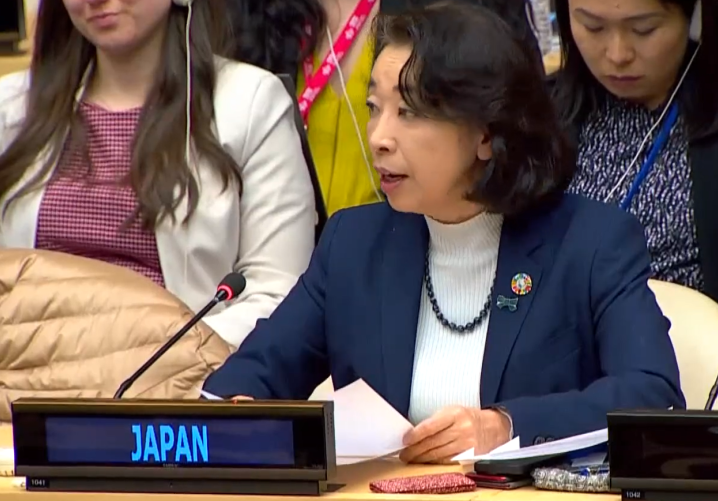LGBTIの人々の人権に関する安保理アリアフォーミュラ会合における志野大使ステートメント
令和5年3月20日

Madame President,
I would like to express my appreciation to you for convening this important Arria- Formula meeting focusing on the integration of LGBTI human rights into the mandate of the Security Council. I thank Mr. Madrigal-Borloz, and all other briefers for their comprehensive briefings.
Madame President,
In recent decades, the world has increasingly recognized the human rights violations and abuses against marginalized communities including LGBTI persons in conflict, and it is imperative that the Security Council address this human security issue as a stand-alone issue.
In order to address this issue in the Security Council, I strongly believe that it is necessary to strengthen efforts at various levels of UN operations and bodies.
First, on the ground: we need to integrate sensitive consideration and protection of human rights regardless of one’s sexual orientation and gender identity into the work of peace operations. Despite the seriousness of this issue, human rights violations and abuses against LGBTI persons in conflict are often overlooked or ignored due to a lack of awareness or understanding among stakeholders. Moreover, it is often underreported due to stigma and fear, and there is also a need to raise awareness in the host communities to increase reporting. In this regard, Japan, through the Japan International Cooperation Agency (JICA), has conducted a survey on the needs of migrant and refugee communities in Colombia in 2020, with data disaggregated by vulnerable populations including gender and sexual orientation. The survey reported that, of respondents in four cities, 5% self-identified as belonging to the population with diverse sexual orientation or gender identity and many of them found barriers to accessing social security and health care.
I believe that a solid collection of evidence will provide a basis for mainstreaming this issue across the Security Council, including through increased reporting on the human rights of LGBTI persons in country-specific reports and in annual reports on Conflict Related Sexual Violence, WPS, YPS, and CAAC, and increasing protection of LGBTI persons.
Second, we need to shed light on this issue across the UN bodies by engaging more Member States. For example, last year, Japan, together with Sierra Leone, co-facilitated the first resolution on international cooperation on access to justice, remedies and assistance for survivors of sexual violence, which was adopted by consensus in the General Assembly. This resolution was tabled under a new agenda item of its own, not limited to women, but to cover all victims and survivors, including men and boys and those who suffer multiple and intersecting forms of discrimination. This specifically calls upon the United Nations system and other international and regional organizations to support the efforts of the Member States to strengthen policies that provide all victims and survivors of sexual violence with access to justice, remedies and assistance. Our efforts should be accelerated.
For example, in Colombia, a recent project by the Global Survivors Fund for Conflict-related Sexual Violence (GSF), which Japan has been contributing to as a board member since its inception, found gaps and insufficient assistance for survivors of conflict related sexual violence, including for LGBTI persons for several decades. It should be noted that the study is the very first and comprehensive of this issue in Colombia.
Madame President,
In the Security Council, and as one of the founding members of the LGBTI core group, Japan reaffirms its commitment to ensuring the human security of LGBTI persons, and I hope that today's discussion will lead to concrete action in this regard.
I thank you.
